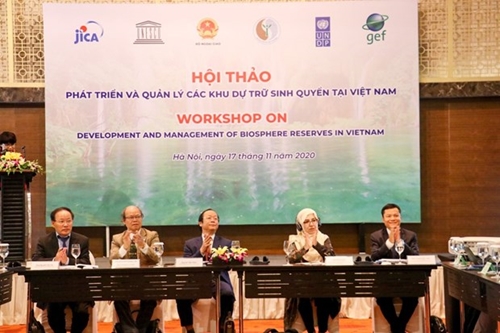The event was organized by the Ministry of Natural Resources and Environment in coordination with the Ministry of Foreign Affairs, the United Nations Development Program (UNDP), the United Nations Educational, Scientific and Cultural Organization (UNESCO) in Vietnam, and the Japan International Cooperation Agency (JICA).
Worldwide, there are 714 biosphere reserves in 129 countries recognized by UNESCO. In Vietnam, the first one recognized was the Can Gio Mangrove Biosphere Reserve in 2000. So far, a total of nine biosphere reserves have been recognized in Vietnam, covering an area of over four million hectares, accounting for about 12.1 percent of the country's area, and home to about 1.78 million people. The development and expansion of the country’s biosphere reserve system is a great effort on the part of the Foreign Ministry, the People's Committees of provinces with Biosphere Reserves, the Vietnam Human and Biosphere Program (MAB Vietnam), and other stakeholders.
    |
 |
|
A workshop on the development and management of biosphere reserves in Vietnam was held in Hanoi on November 17. |
However, most of the protected areas and biosphere reserves are located in areas with high poverty rates, so achieving the goal of both conservation and economic development faces many difficulties. In addition, other barriers include the lack of a common framework to implement integrated solutions in sustainable development, ineffective organization and coordination of stakeholder participation in the biosphere reserves, and ineffective planning capacity on the basis of the landscape approach.
“This workshop is an opportunity for all stakeholders to recognize and evaluate the results achieved after 20 years of joining the UNESCO biosphere reserve network, while also discussing solutions for the sustainable management of biosphere reserves and development orientations for the network of biosphere reserves in the coming time,” said Deputy Minister of Natural Resources and Environment Vo Tuan Nhan at the workshop.
“It is essential to raise awareness about the crucial role of biosphere reserves in protecting the rich biodiversity of Vietnam. We need stronger public partnerships and effective strategies for active local stakeholder engagement that will strengthen Vietnam’s biosphere reserves for a better future for the country and achievement of the SDGs,” said Sitara Syed, UNDP Deputy Resident Representative in Vietnam.
“Biosphere Reserve” is a title awarded by the United Nations Educational, Scientific, and Cultural Organization (UNESCO) to “coastal or terrestrial ecosystems that help promote solutions to harmonize protection and preserve biodiversity with sustainable use of that area.”
The goal of the biosphere reserves is to ensure harmony between humans and nature through the implementation of the three main functions of conservation, development, and support. Approaches to managing the biosphere reserves are open, interdisciplinary, and multi-disciplinary.
Source: VNA